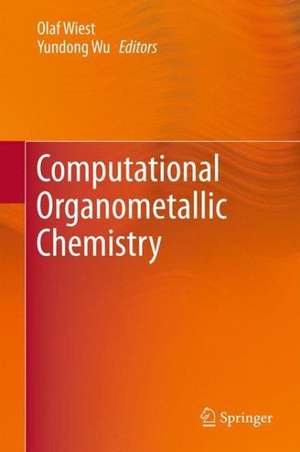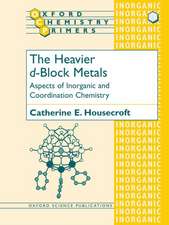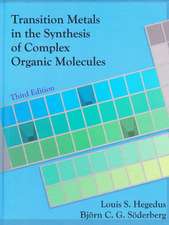Computational Organometallic Chemistry
Editat de Olaf Wiest, Yundong Wuen Limba Engleză Paperback – 13 apr 2014
| Toate formatele și edițiile | Preț | Express |
|---|---|---|
| Paperback (1) | 639.25 lei 6-8 săpt. | |
| Springer Berlin, Heidelberg – 13 apr 2014 | 639.25 lei 6-8 săpt. | |
| Hardback (1) | 644.95 lei 6-8 săpt. | |
| Springer Berlin, Heidelberg – 29 feb 2012 | 644.95 lei 6-8 săpt. |
Preț: 639.25 lei
Preț vechi: 752.06 lei
-15% Nou
Puncte Express: 959
Preț estimativ în valută:
122.34€ • 126.75$ • 102.10£
122.34€ • 126.75$ • 102.10£
Carte tipărită la comandă
Livrare economică 21 martie-04 aprilie
Preluare comenzi: 021 569.72.76
Specificații
ISBN-13: 9783642443688
ISBN-10: 3642443680
Pagini: 264
Ilustrații: VIII, 256 p.
Dimensiuni: 155 x 235 x 14 mm
Greutate: 0.39 kg
Ediția:2012
Editura: Springer Berlin, Heidelberg
Colecția Springer
Locul publicării:Berlin, Heidelberg, Germany
ISBN-10: 3642443680
Pagini: 264
Ilustrații: VIII, 256 p.
Dimensiuni: 155 x 235 x 14 mm
Greutate: 0.39 kg
Ediția:2012
Editura: Springer Berlin, Heidelberg
Colecția Springer
Locul publicării:Berlin, Heidelberg, Germany
Public țintă
ResearchCuprins
DFT Studies on Zirconium-Mediated Reactions.- Computational Organometallic Chemistry with Force Fields.- New insights onto the molecular mechanism of H2 activation.- Transition Metal-Catalyzed Hydrogenations.- Mechanistic insights into selective oxidation of light alkanes by transition metal compounds/complexes.- Computational Studies on Osmium Catalyzed Olefin Oxidation Reactions.- Reactivity of Metal Carbene Clusters PtnCH2+ and PtMCH2+ (M=Cu, Ag, Au, Pt, Rh) toward O2 and NH3: A Computational Study.- Cobalt Catalyzed Hydroformylation and Cobalt Carbonyl Clusters: Recent Computational Studies.
Textul de pe ultima copertă
Computational methods have become an indispensible tool for elucidating the mechanism of organometallic reactions. This snapshot of state-of-the-art computational studies provides an overview of the vast field of computational organometallic chemistry. Authors from Asia, Europe and the US have been selected to contribute a chapter on their specialist areas. Topics addressed include: DFT studies on zirconium-mediated reactions, force field methods in organometallic chemistry, hydrogenation of π-systems, oxidative functionalization of unactivated C-H bonds and olefins, the osmylation reaction, and cobalt carbonyl clusters. The breadth and depth of the contributions demonstrate not only the crucial role that computational methods play in the study of a wide range of organometallic reactions, but also attest the robust health of the field, which continues to benefit from, as well as inspire novel experimental studies.
Caracteristici
A snapshot of a large field which has expanded dramatically in recent years Experts from Europe, Asia and the US write about their specialist area of computational organometallic chemistry Inspiration for novel experimental studies Includes supplementary material: sn.pub/extras









